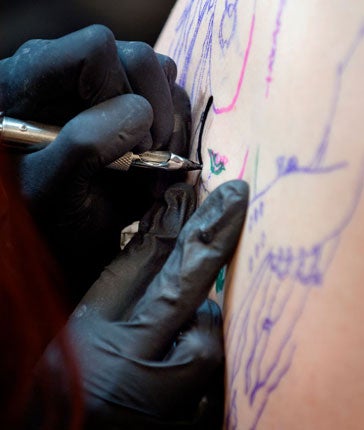Home tattoo kits 'are putting teenagers at risk from disease'

Teenagers are putting themselves at risk of debilitating and potentially deadly blood diseases by buying DIY tattoo kits over the internet. At £60 a time, the kits come with inks, needles and designs but there are no controls over age of the recipient, infectious diseases, or cleanliness. Children have caught hepatitis from such kits, which are cheaper than visiting a professional, particularly if used several times.
The Chartered Institute of Environmental Health (CIEH) sounded the alarm after carrying out an investigation into tattooing trends and practise. Professional parlours are legally required not to tattoo anyone under 18 and are licensed and inspected by local authorities. By contrast, Chinese-made kits often have no instructions.
Julie Barratt, the CIEH director, said: "The age of consent goes out the window. You are not going to ask questions about health. You could be tattooing your mates all in one go and passing on infections. You also cannot trace people if anything goes wrong. You wouldn't do this with anything else – you can't stroll into Boots and buy a needle."
Unsafe tattooing – without health screening and cleanliness – risks spreading HIV/Aids and hepatitis. In Llanelli, south Wales, in 2008, teenagers as young as 14 using DIY kits found that their tattoos becoming infected and Several contracted hepatitis.
In a study to be published on Thursday, the CIEH's Wales researcher, Stephanie Powell, found that more than half of professional tattooists broke rules on best practise. Students visited parlours posing as potential customers and asked by telephone whether tattooists would work at an all-weekend 30th birthday party.
Of the 33 parlours visited, only 61 per cent screened for medical conditions and only 52 per cent offered any advice. Only 7 per cent asked for proof that the client was an adult. Of 56 licensed parlours asked whether they would attend the party, 49 rejected the idea. However, seven accepted despite the likelihood of the clients' decisions being influenced by alcohol or peer pressure. Conditions might have been unclean or unsafe for other reasons. The research, carried out in Cardiff, Caerphilly, Newport, Bridgend, Monmouthshire, Rhondda-Cynon Taf, Torfaen and the Vale of Glamorgan, will be presented to a CIEH conference on Thursday.
Describing some of the findings as "astonishing", Ms Barratt said tattoos should be regulated more closely because they were occasional purchases as well as being permanent. "It's not like having your fringe cut – it's not going to grow back," she said.
Charles Gore, the Chief Executive of The Hepatitis C Trust, said: “The rise in DIY tattooing is particularly alarming when you consider viruses such as hepatitis C. Most people don't realise that transmission's not just about needles: sharing any equipment, including things like ink pots, is a risk. Often hepatitis C has no symptoms for decades so anyone who has had a tattoo that might not have been safe, at home or on holiday, should think about getting tested. Like everything, hepatitis C is a lot easier to treat if it's caught early.”
Join our commenting forum
Join thought-provoking conversations, follow other Independent readers and see their replies
Comments
Bookmark popover
Removed from bookmarks